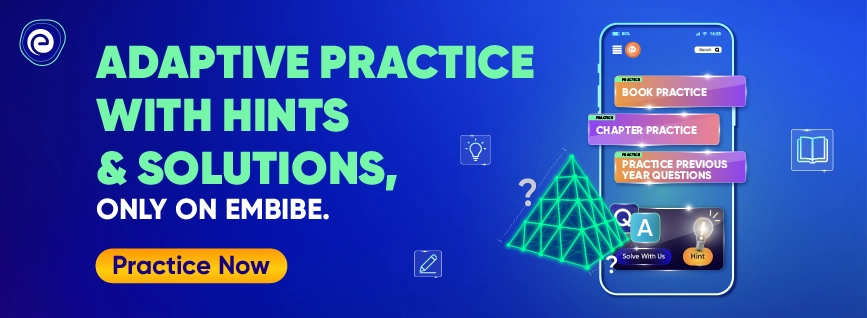- Written by nikhil
- Last Modified on 18-01-2023
Exam Brief
Uttarakhand Board of School Education (UBSE) was established in 2001 to handle the State’s Secondary and Senior Secondary Education. The board follows the CCE (Continuous and Comprehensive Evaluation) curriculum and conducts Formative Assessment (FA) and Summative Assessment (SA) in the 6th, 7th, 8th, 9th Class Examination. It is also in charge of releasing the results of the Board examination. More than 10,000 schools are currently affiliated with the Board.
Class 8 is crucial for all students and should be taken seriously. In Class 8, students study the CBSE curriculum, as recommended by the Uttarakhand State Board. Students must be familiarised with the UK Class 8 syllabus to prepare for their examinations & the exam is paper-and-pen based. Read on to know more about Uttarakhand Board Class 8.
Exam Summary
Before proceeding towards Uttarakhand Board Class 8 details, students must go through the exam overview for a better understanding.
|
Full Exam Name
|
Uttarakhand Board 8 Examination
|
|
Short Exam Name
|
UK Board 8
|
|
Conducting Body
|
Uttarakhand Board Of School Education (UBSE)
|
|
Frequency of Conduct
|
Once a year
|
|
Exam Level
|
School Level
|
|
Languages
|
English, Hindi
|
|
Mode of Application
|
Offline
|
|
Mode of Exam
|
Offline
|
|
Exam Duration
|
3 Hours
|
Learn Exam Concepts on Embibe
Official Website Link
https://ubse.uk.gov.in/
Syllabus for Class 8 UK Board
The syllabus is the essential thing that students need to know when studying for an exam. The Uttarakhand syllabus plays a significant part in creating the blueprint for academic examinations. It is also beneficial to students since it allows them to comprehend the course structure and prepare adequately by learning all of the significant topic courses listed in the syllabus. One may readily grasp the process of fundamental studies for numerous courses by looking at the syllabus. The syllabus is similar to the CBSE Board.
UK Class 8 Mathematics Syllabus
The following is the Uttarakhand Board Mathematics Syllabus for Class 8:
| Chapter Name |
Topics |
| Number System |
- Knowing our Numbers
- Playing with Numbers
- Whole numbers
- Negative Numbers and Integers
- Fractions
|
| Algebra |
|
| Ratio and Proportion |
- Concept of Ratio
- Proportion as equality of two Ratios
- Unitary method (with only direct variation implied)
- Word problems
|
| Geometry |
- Basic geometrical ideas (2 -D)
- Understanding Elementary Shapes (2-D and 3-D)
- Symmetry: (reflection)
- Constructions (usingStraight edge Scale, protractor, compasses)
|
| Mensuration |
- Concept of Perimeter and Introduction to Area
- Perimeter of a rectangle – and its special case – a square
|
| Data handling |
- What is data – choosing data to examine a hypothesis?
- Collection and organisation of data – examples of organising it in tally bars and a table.
- Pictograph- Need for scaling in pictographs interpretation & construction.
- Making bar graphs for given data interpreting bar graphs
|
UK Class 8 Social Science Syllabus
Social Science is divided into History, Civics/Political Science, Geography. The following is the Uttarakhand Board Social Science Syllabus for Class 8:
Syllabus for UK Class 8 History
| Chapter Number |
Name of the Chapters |
| Chapter 1 |
How, When and Where |
| Chapter 2 |
From Trade to Territory |
| Chapter 3 |
Ruling the Countryside |
| Chapter 4 |
Tribals, Dikus and the Vision of the Golden Age |
| Chapter 5 |
When People Rebel |
| Chapter 6 |
Colonialism and the City |
| Chapter 7 |
Weavers, Iron Smelters and Factory Owners |
| Chapter 8 |
Civilising the “Native”, Educating the Nation |
| Chapter 9 |
Women, Caste and Reform |
| Chapter 10 |
The Changing World of Visual Arts |
| Chapter 11 |
The Making of the National Movement 1870s-1945 |
| Chapter 12 |
India after Independence |
Syllabus for UK Class 8 Civics/Political Science
| Chapter Number |
Name of the Chapters |
| Unit One: The Indian Constitution and Secularism |
| Chapter 1 |
The Indian Constitution |
| Chapter 2 |
Understanding Secularism |
| Unit Two: Parliament and the Making of Laws |
| Chapter 3 |
Why do we need a Parliament? |
| Chapter 4 |
Understanding Laws |
| Unit Three: The Judiciary |
| Chapter 5 |
Judiciary |
| Chapter 6 |
Understanding Our Criminal Justice System |
| Unit Four: Social Justice and the Marginalised |
| Chapter 7 |
Understanding Marginalism |
| Chapter 8 |
Confronting Marginalism |
| Unit Five: Economic Presence of the Government |
| Chapter 9 |
Public Facilities |
| Chapter 10 |
Law and Social Justice |
Syllabus for UK Class 8 Geography
| Chapter Number |
Name of the Chapters |
| Chapter 1 |
Resources |
| Chapter 2 |
Land, Soil, Water, Natural Vegetation and Wildlife Resources |
| Chapter 3 |
Mineral and Power Resources |
| Chapter 4 |
Agriculture |
| Chapter 5 |
Industries |
| Chapter 6 |
Human Resources |
Syllabus for UK Class 8 English
English is divided into two parts:
- English Literature
- English Grammar & Composition.
The UK Class 8 English Literature section is based on a leading textbook of English and a Supplementary Reader in English.
Syllabus for UK Class 8 English (Honeydew – Textbook in English for Class 8)
| Chapter Number |
Name of the Chapters |
| Chapter 1 |
The Best Christmas Present in the World |
| Poem |
The Ant and the Cricket |
| Chapter 2 |
The Tsunami |
| Poem |
Geography Lesson |
| Chapter 3 |
Glimpses of the Past |
| Poem |
Macavity: The Mystery Cat |
| Chapter 4 |
Bepin Choudhury’s Lapse of Memory |
| Poem |
The Last Bargain |
| Chapter 5 |
The Summit Within |
| Poem |
The School Boy |
| Chapter 6 |
This is Jody’s Fawn |
| Poem |
The Duck and the Kangaroos |
| Chapter 7 |
A Visit to Cambridge |
| Poem |
When I set out for Lyonnesse |
| Chapter 8 |
A Short Monsoon Diary |
| Poem |
On the Grasshopper and Cricket |
| Chapter 9 |
The Great Stone Face – I |
| Chapter 10 |
The Great Stone Face – II |
Syllabus For UK Class 8 English (It So Happened – Supplementary Reader in English for Class 8)
| Chapter Number |
Name of the Chapters |
| Chapter 1 |
How the Camel got his Hump |
| Chapter 2 |
Children at work |
| Chapter 3 |
The Selfish Giant |
| Chapter 4 |
The Treasure within |
| Chapter 5 |
Princess September |
| Chapter 6 |
The Fight |
| Chapter 7 |
The Open Window |
| Chapter 8 |
Jalebis |
| Chapter 9 |
The Comet – I |
| Chapter 10 |
The Comet – II |
Syllabus For UK Class 8 English Grammar & Composition
This section is also subdivided into two parts – English Grammar and English Composition (Writing).
| No. |
English Grammar |
English Composition (Writing) |
| a |
Order of Words and Clauses |
Notice |
| b |
Direct and Indirect Speech |
Story |
| c |
Active and Passive Voice |
Formal and Informal Letters |
| d |
Tenses |
Diary Entry |
| e |
Noun |
Essay |
| f |
Pronoun |
|
| g |
Verb |
|
| h |
Adverb |
|
| i |
Prepositions |
|
| j |
Conjunction |
|
| k |
Phrases and Idioms |
|
| l |
Vocabulary |
|
| m |
Comprehension Reading |
|
UK Class 8 Hindi Syllabus
The following is the Uttarakhand Board Hindi Syllabus for Class 8:
Hindi is divided into two parts:
- Hindi Literature
- Hindi Grammar & Composition
Syllabus for UK Class 8 Hindi Literature
The UK Class 8 follows many textbooks. Here, the syllabus is taken from a book called “Bharat Ki Khoj”.
| Chapter Number |
Name of the Chapters |
| 1 |
अहमदनगर का किला |
| 2 |
तलाश |
| 3 |
सिंधु घाटी सभ्यता |
| 4 |
युगों का दौर |
| 5 |
नयी समस्याएँ |
| 6 |
अंतिम दौर -एक |
| 7 |
अंतिम दौर -दो |
| 8 |
तनाव |
| 9 |
दो पृष्ठभूमियाँ – भारतीय और अंग्रेज़ी |
Practice Exam Questions
Syllabus for UK Class 8 Hindi Grammar & Composition
| Chapter Number |
Name of the Chapters |
| 1 |
पुनरुक्ति शब्द |
| 2 |
वाक्यनिर्माण |
| 3 |
संज्ञा |
| 4 |
विशेषण |
| 5 |
कारक |
| 6 |
अनेकार्थीशब्द |
| 7 |
विभक्ति |
| 8 |
प्रत्यय |
| 9 |
शब्द परिवार |
| 10 |
संधि |
| 11 |
समास |
| 12 |
द्वंद्व |
| 13 |
उपसर्ग |
| 14 |
अनेक शब्दों के लिए एक शब्द |
| 15 |
मुहावरे |
| 16 |
समानार्थी |
Study Plan to Maximise Score
Preparation Tips
During exam preparation, students should follow specific guidelines, and some of the most effective approaches utilised by toppers are listed below:
- In subjects like Mathematics: equations, derivations, and formulae are involved, so students are required to concentrate more on them.
- Practice all the diagrams and their labelling correctly.
- At least one month before the exam, students should finish the full UK Class 8 curriculum 2022.
- Students should revise everything daily. Otherwise, students may not recall the things discussed previously, and all of the hard work will be wasted.
- Start working on previous year question papers after finishing the UK Class 8 curriculum 2022. After completing them, students will have a thorough grasp of exam patterns, mark distribution, and paper difficulty levels.
- Students should focus on their writing abilities and improve their grammar for Hindi and English subjects.
- Science and Social Science are both theoretical disciplines that require long answers. All the phrases should be written in points to make them easier to understand. This will get students some bonus points since it makes reading the answers easier for the examiner.
- Sitting for long periods might lead to failed concentration attempts. Therefore, students should take breaks while studying. It is necessary to give the brain a break every hour to re-energize it.
- Students must remember that what they know is essential rather than what they do not know.
Exam Taking Strategy
Below we have provided some exam-taking strategies for UK Class 8 Students:
- During exam preparation, students should devote more time to revision.
- Read the textbooks for Social Science as History topics have more weightage in exams and also give importance to other chapters from Geography, and Economics.
- Students must begin writing notes on a daily basis in order to improve their English skills and familiarise themselves with the exam environment.
- Break down the UK 8th coursework into short-term objectives and try to achieve them. This will help students regain their confidence and motivation to achieve their objectives.
- Give more importance to important diagrams in Biology and also for repetitive questions that were asked in previous years’ examinations.
Detailed Study plan
- A comprehensive study plan is a well-structured plan created by students that lists their learning objectives and time commitments.
- It is preferable to develop a daily study schedule. Spend four to five hours every day studying.
- If you forget equations or formulas, make a chart, stick it in your study room and have a look at it every day.
- Connect all of your subjects or topics to real-life situations as you study them. It will make it easy for you to recall all of the concepts, especially Social Science.
- Embibe has developed engaging videos and practise sessions on all of the 8th Class subjects, which you may utilise to grasp all the ideas better.
Simple study plan for Class 8 students is given below:
| Days |
Subjects |
| 1-10 |
Mathematics |
| 11-20 |
Science |
| 21-25 |
English |
| 26-35 |
Social Studies |
| 36-40 |
Hindi |
| 40-60 |
Revision with previous year papers is mandatory |
Tips for preparing for the UK CLASS 8 Exam
- Make important notes for all the subjects.
- Draw the diagrams and flowcharts wherever required in the exam paper.
- Practice sample papers and previous year papers regularly to identify weak areas.
- Revision is essential, so go through each topic several times.
- Get a good grammar book and go over all of the essential topics. Study the rules and try to answer as many questions as you can.
Student Counselling
- Every student has their own vision of their future job and objectives. Choosing the right path for seeking a job after school is the most difficult decision a student will make during his or her educational career.
- To achieve this, they must give their best in all exams. Class 8 is particularly significant since a student must pass the Class 8 exam to attend Class 9. They should discuss with their parents about the exam fears since parents will assist them in overcoming the same.
- Students should always consider how to improve during their educational phase and make the most of their golden years. One should begin to develop interests in things they plan to study in the future.
Parent/Gaurdian counselling
- Career counselling is the process of guiding students on their journey to self-discovery and self-realisation, and supporting them as they overcome self-doubt. In this regard, parents and elders play a significant role in mentoring children.
- Parents should watch their children from the start and teach them the value of exams on educational platforms. They should assist them in achieving success by guiding them down the correct route.
- During the Covid-19 pandemic, there was a significant crisis in the school sector, and parents and students were concerned. As a result, the government set up several mental health programs to help people cope with stress.
- Parents always want their children to be engineers, doctors, or social workers, but they must consider which sector their child is knowledgeable in and which is appropriate for their skills.
- These considerations must be kept in mind when suggesting a course for their children, and they must support them in pursuing the course their child desires.
Frequently Asked Questions
Q1. Where can I get the up-to-date information about the UK Class 8th result for the year 2022?
A. For the up-to-date information on the UK Class 8th result, students should visit the school office and check the notice board.
Q2. How can I obtain good grades in Mathematics in Class 8?
A. Students can obtain good grades in Mathematics Class 8 by reading the problems carefully, revising appropriately, practising all the questions, attempting mock tests, etc.
Q3. What are the UK Class 8 exam passing marks?
A. To pass the exam, students must get a minimum of 33% overall marks.
Q4. Where can I get a copy of the timetable for the UK Class 8th 2022 exam?
A. Students can get the official UK Class 8 timetable from their respective schools which will be displayed on the notice board.
Q5. In Class 8, how many hours should one study?
A. To get good grades in UK Class 8, one needs to study for at least 4-5 hours every day.
Dos and Donts
Q1. Where can I get the up-to-date information about the UK Class 8th result for the year 2022?
A. For the up-to-date information on the UK Class 8th result, students should visit the school office and check the notice board.
Q2. How can I obtain good grades in Mathematics in Class 8?
A. Students can obtain good grades in Mathematics Class 8 by reading the problems carefully, revising appropriately, practising all the questions, attempting mock tests, etc.
Q3. What are the UK Class 8 exam passing marks?
A. To pass the exam, students must get a minimum of 33% overall marks.
Q4. Where can I get a copy of the timetable for the UK Class 8th 2022 exam?
A. Students can get the official UK Class 8 timetable from their respective schools which will be displayed on the notice board.
Q5. In Class 8, how many hours should one study?
A. To get good grades in UK Class 8, one needs to study for at least 4-5 hours every day.
List of Educational Institutions
List of Schools
The best schools for 8th Uttarakhand Board are listed below:
| School Name and Location |
| Woodstock School, Mussoorie |
| All Saints’ College, Nainital |
| Birla Vidya Mandir, Nainital |
| Col Brown Cambridge School, Dehradun |
| Doon School, Dehradun |
| Convent of Jesus & Mary Dehradun |
| Welham Girls school, Dehradun |
| Oak Grove School, Mussoorie |
| GD Birla Memorial School for Boys, Ranikhet |
| Rashtriya Indian Military College, Dehradun |
| Mussoorie International School, Mussoorie |
| Sainik School Ghorakhal, Nainital |
| Sherwood College, Nainital |
| St. George’s College Mussoorie |
| Confluence World School, Rudrapur Uttarakhand |
Counselling
Parents and elders play an essential role in guiding children to achieve success in education. Parents should keep an eye on their children and help them understand the subjects and score good grades in exams. There were challenges faced by schools, parents and students during the COVID-19 pandemic. To avoid this, the government has set up various mental health programs that helped them cope with the stress. Parents should always encourage their kids and praise them for their efforts and achievements during examinations.
List of Future Exams
Over time education has evolved and now it is the key to human achievement, and competition plays a motivating factor. Competitive exams give students good motivation to attain their objectives. Students should constantly have an outside perspective apart from their academics. Competitive exams have become an essential part of our educational system.
Studying for UBSE Class 8 exams also help students in preparing for other competitive examinations such as:
- National Talent Search Examination (NTSE): Scholarships and cash awards help eligible students prepare for the upcoming academic year.
- GeoGenius: The goal of this exam is to stimulate one's interest in Geography. Students must mark the various locations of India on a blank map in this test.
- National Interactive Maths Olympiad (NIMO): It is a competition that takes place every year. This exam assesses and evaluates mental and Mathematical skills.
- National Level Science Talent Search Exam (NLSTSE): Maths, Physics, Chemistry, Biology, and other general awareness questions are included in this exam.
- Indian National Olympiad (INO): Physics, Chemistry, Biology, Astronomy, and Junior Science are some subjects covered by the Indian National Olympiad (INO). A five-stage method is used in this test. The initial stage is the written exam conducted by NSE (National Standard Examination).
- International Science Olympiad (ISO): International Science Olympiad (ISO) test is a global Olympiad competition in which students worldwide compete. It provides a forum for aspiring talent to put their abilities to the test. Exams like this prepare students for both national and international contests.
- International Mathematics Olympiad (IMO): The International Mathematical Olympiad (IMO) is an annual high school Mathematics competition in a new country each year. The inaugural IMO was held in Romania in 1959, with seven nations taking part. It has progressively grown to encompass more than 100 nations across five continents. The International Maritime Organization's Board guarantees that the tournament takes place every year and each host country follows the IMO's rules and traditions.
- English International Olympiad (EIO) : The essential educational subject for students to study is English. The English International Olympiad (EIO) test is designed to help students improve their English spelling, grammar, and sentence structure, as well as their language abilities. The process of learning a language is never-ending. There is always room for development in such areas. The objective of the English Olympiad test is to develop a student's skills by familiarising them with fundamental topics. As a result, the Indian Talent Olympiad test prepares students for national and international competitions. This exam draws students from a variety of schools around the country. The test covers English language knowledge and proficiency. Students in Class 1 through 10 are eligible to take the test. It aids students in gaining ability in the English language.
- General Knowledge International Olympiad (GKIO) : Students who keep up with current events and what's going on globally go a long way towards advancing their professions. General Knowledge International Olympiad (GKIO) is an exam administered by the Indian Talent Olympiad that assesses a student's General Knowledge in areas such as environment, Science & Technology, Geography, History, plants & animals, entertainment, life skills, language & literature, transportation, sports, Civics, and Politics. As a result, the exam is not restricted to current events but instead focuses on children's entire development. It is one of the few tests that require students to learn something new.
- International Computer Olympiad (ICO): International Computer Olympiad (ICO) is one of the most exciting exams for the subject. ICO is open to students in classes 1 through 10. The purpose of this test is to educate and prepare young brains for the future. As the world becomes more digital, such tests are becoming more common.
- International Drawing Olympiad (IDO): Exams for the International Drawing Olympiad (IDO) are held once a year at the national level at individual schools. Aside from academic excellence, students should concentrate on soft talents such as drawing, painting, sketching, etc. Students in Class 1 through 10 are eligible to participate in the drawing competition. The purpose of such tests is to improve and sharpen their imagination. It enables students to strike a balance between their studies and extracurricular interests. The most acceptable form of expression that displays natural creativity is drawing.
- National Essay Olympiad (NESO): Essay writing is a form of art. To create a successful essay, you need to have an exceptional understanding of the subject, mastery of the English language, excellent sentence structure, and a solid vocabulary. The National Essay Olympiad (NESO) is for students who demonstrate all of these characteristics. This test is accessible to students in Classes 1 through 10. Mathematics, Science, General Knowledge, English, and Computers are examples of mainstream topics. It enables students to put their language skills to the test. It encourages people to share stories, which makes them more fascinating. Students must be familiar with the topics on which they want to write essays.
- National Social Studies Olympiad (NSSO): National Social Studies Olympiad (NSSO) is a standardised test that assesses students' understanding of History, Geography, and Civics. It is held once a year at the national level by the Indian Talent Olympiad. The test will take place on school grounds. The NSSO syllabus is divided into courses and contains the fundamentals of all boards. Students from several boards, including State, CBSE, ICSE, and International boards, can sit the Social Studies test.
Practical Knowledge/Career Goals
Learning from Real World
Real-world education allows students to apply what they learn in the classroom to real-life situations. Students have a better grasp of objects and subject matter when they have real-life experience, and learning becomes more enjoyable. We need to give our kids consistent, real learning experiences such as activities, experiments, field trips, group activities, and so on.
Future Skills
Students in UK Class 8 can participate in coding as a creative activity. It helps in the development of computational thinking, problem-solving abilities, critical thinking, and exposure to real-life scenarios to solve issues in various fields.
If one has the information listed below, one can be effective in an automated or technological situation. Engineers, Developers, and other IoT professionals are in great demand as a result. These professionals will need a diverse set of skills at all levels of the technical stack to develop and maintain IoT infrastructure at scale.
- Machine learning and artificial intelligence
- Information safety
- API testing and automation for mobile app development
- UI/UX design
- User experience and user interface design.
Career Skills
Primary education strengthens listening skills, understanding diversity in the workplace, language skills, research skills, planning, leadership skills, emotional balance, self-survey, exploring information, communication skills, etc. This may be accomplished by providing opportunity and encouragement to each student at every stage of their growth.
















































